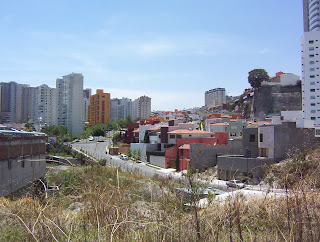 As a French national, I was allowed the opportunity to cast my vote for President de la Republique. French expatriates and others like myself reported to the Dallas International School, an elegant Gary Cunningham-designed private campus founded by French corporate executives to educate their children (Alcatel telecom and Accor hotels have a big presence here), to cast our ballots. It was quite unlike voting in an American election, where one fills in a scan-tron sheet full of numerous items with a pencil. Rather, voting for the French president consisted of taking two slips of paper, each with one of the candidates' name on it, then going behind a standing booth. The act of voting was completed by throwing away the slip of paper of the candidate you did not want into the waste-paper basket below the booth, and inserting the slip of your chosen candidate into an envelope. Finally I walked over to a table with transparent box containing all of the completed ballots, dropped the envelope through the slit sealed by a special trap door (to probably prevent vote-tampering).
As a French national, I was allowed the opportunity to cast my vote for President de la Republique. French expatriates and others like myself reported to the Dallas International School, an elegant Gary Cunningham-designed private campus founded by French corporate executives to educate their children (Alcatel telecom and Accor hotels have a big presence here), to cast our ballots. It was quite unlike voting in an American election, where one fills in a scan-tron sheet full of numerous items with a pencil. Rather, voting for the French president consisted of taking two slips of paper, each with one of the candidates' name on it, then going behind a standing booth. The act of voting was completed by throwing away the slip of paper of the candidate you did not want into the waste-paper basket below the booth, and inserting the slip of your chosen candidate into an envelope. Finally I walked over to a table with transparent box containing all of the completed ballots, dropped the envelope through the slit sealed by a special trap door (to probably prevent vote-tampering).Although it felt awkward to me at first, I now believe that the act of throwing away one of the choices was an appropriately symbolic way of my desire to see France get rid of the old way of doing things in order to begin anew. For anybody who've read my previous postings, I naturally voted for the candidate who promised a much-needed change in direction, Nicolas Sarkozy. I've followed his rise through the French political ranks, and I was impressed by his verbal response to the recent riots in France. Watching him in his debate with his socialist rival Segolene Royal, I was comforted by his cool demeanor, his command of the facts and his embrace of pro-growth economic policies. Beyond this, I appreciate the fact that he did not come from the Ecole Nationale d'Administration (ENA) the elite school that has traditionally groomed the French political elite for the last few generations. It produced a constant stream of technocrats and unaccountable leaders unable to re-think the problems plaguing France.
I've waited for a little time to pass before making any judgement on whether Sarkozy was for real. With the appointment of an untraditional foreign minister and his plan to revamp France's mediocre university system, it seems that some form of change is on the way. My wish for my birth country isn't that it becomes more American, but rather that becomes strong and confident. France has all the prerequesites to becoming economically and culturally dynamic, magnanimous and cooperative in its foreign policy. It can also distinguish itself as a Western European country that can remake itself for a new era and challenges, feigning traditional answers to lagging problems and instead trying out new ideas from the ground up. France could show the way in dealing practically about Europe's alienated Muslim population, standing up for the primacy of its culture over the relativist currents that infect mentality of many on the continent.
Most importantly, from the perspective of this Franco-American, I hope for a France that grows out of its debilitating anti-Americanism. More than simply wishing for a greater diplomatic rapprochement between France and the U.S., I'm hoping that daily conversations and news articles among the French will not be consumed by an anti-American point of view. It's allright to maintain an identity of independence from the U.S. with defining it as anything opposite of American identity. Anti-americanism is an ideology in that it takes very narrow assumptions about what Americans are and builds from them a coherent set of ideas that permits a narrow kind of thinking. Like any ideology, it limits one's ability to generate new ways of solving problems, since narrow assumptions are inadequate to think realistically about the causes of problems. Regardless how much we'd like to believe that Americans only want to spread the rapacious forces of market capitalism, secure single-mindedly all of the world's natural resources for itself and infect the globe with decadent pop culture, these kind of assumptions fail spectacularly in understanding our motives and fails even worse in predicting what Americans will do in the future.
Although anti-Americanism can be politically useful in the short term, overall it has always been unhelpful to those who succumb to it. It has never mad anybody wealthier, more productive, more independent nor has it led to any greater level cultivation. Complementing the adversarial foreign policy of the French against American interests during the last few decades has been a denial by many French citizens of real problems that would have been better addressed were they not to reflexively label anything untraditional as American. The common French journalistic practice of calling certain policies "Anglo-Saxon" deliberately narrows the ways the French define themselves, declaring that if it's been done in England or the U.S., it can never be done in France. To not be "Anglo-Saxon" makes "dirigiste" the default "French" policy for everything. Thus, Anti-Americanism and its anti-Anglo-Saxon variant only strengthens the bureaucratic and political elite of France, leaving all other classes of French people no better off. I can't emphasize enough how many times I would listen to my French relatives whine about the same problems that afflict their people, and each and every time would not even give ideas coming from American experience the time of day. The cultural identity of the French has become firmly entrenched in the socio-political tradition of the country, to the point that to be French is to also be a socialist. Somehow it is lost to many that in other times the French could monarchists, democratic totalitarians (French Revolution), Colonial Imperialists, and so on. Why isn't it just as French to be freedom-worshipping individualistic entrepreneurs?
That is my hope from a leader like Monsieur Sarkozy. I'm less interested that he is described as pro-American by some media outlets than that he's transcended the flippant critiques of Americans that have been a pastime of previous French presidents. He has the courage to tell the French people what they are not used to hearing from their leaders. And he is wise enough to realize than the balm of anti-americanism in France is an impediment to reclaiming and redefining what the French can be. If Sarkozy does disagree with the U.S. on certain policies, it is hoped that the merits of his arguments rely on more than opposition for opposition's sake. In terms of international alliances I'm hoping that he'll associate with a better set than Islamist dicatorships, shady African genocidal regimes, and other Third World countries too feeble to break free from France's current neo-colonialist policies. If he makes such changes France will have a firmer standing in opining on affairs affecting the world at large.
Contrary to what many Frenchmen may believe about people like me, we do not wish for France to become another American drone or "poodle". We wish only that it act reasonably on all issues from a position of confidence, not craven fecklessness. A sensible, robust, prosperous and confident France will make the job of maintaining international order that much easier on all nations, especially on the U.S. Maybe I'm expecting too much from Sarko, but the act of throwing away the ballot for Segolene Royal at the booth reminded me that eliminating the accumulation of socialist stasis on my birth country was an available choice for me this time.


